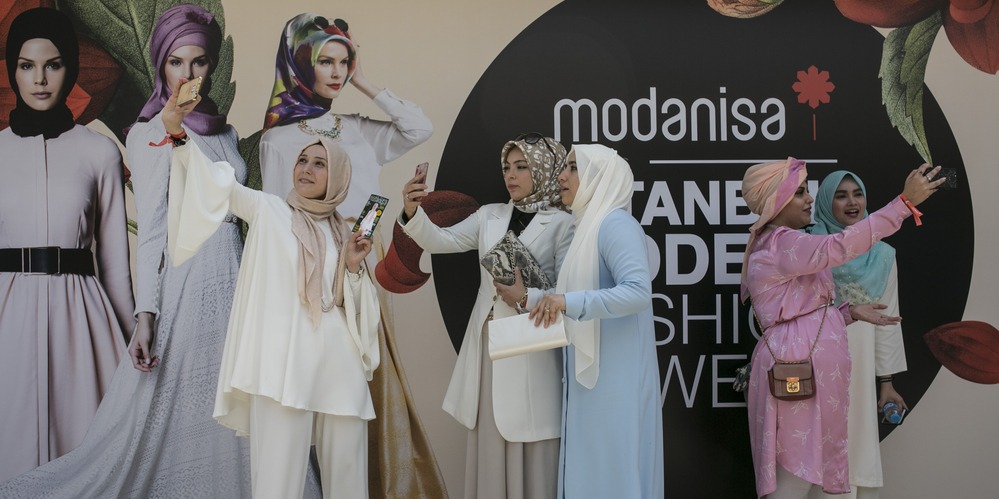In-person, online, hybrid: How will Islamic economy lifestyle events be held this year?
As the COVID-19 pandemic continues to restrict full-scale events, the online sector continues to thrive and one year on, some organisers are asking if big in-person affairs are at all necessary.
The world’s exhibition and trade show industry contracted by 68% last year, affecting 2.4 million jobs. In the Middle East, revenues were only 24% of 2019’s, in the Asia Pacific region 32%, according to the Global Association of the Exhibition Industry.
Where it was possible, Islamic economy events went online completely, or took the hybrid route. Among the bigger industry events last year, Dubai’s Global Islamic Economy Summit held a series of online panel sessions and webinars, and Turkey’s World Halal Summit went hybrid.
This year, Gulfood in Dubai was the first large-scale Islamic economy trade event held in-person from Feb 21 to 25. Dubai expects even more visitors and tourists come October when the Expo opens.
But these big fully in-person Islamic economy events based on pre-pandemic business models are being challenged, especially where technology and virtual appearances can do the job.
In the lifestyle sectors, Indonesian designer Ali Charisma ran a fully virtual fashion event on the weekend and the new MUSLIM CHNGMKRS is happening thanks to economic efficiencies made possible by going completely online.
“I think it’s the way to go,” MUSLIM CHNGMKRS organiser Marta Maryam Rozsa, the CEO and Founder of Noor and Zafir, told Salaam Gateway. “You can bring people together from everywhere in the world, without the need of huge budgets.
“Suddenly, you realise how limiting physical events are,” Rozsa said about attracting speakers and reaching a wider audience.
She has the professional experience under her belt to pull off the event. For almost 20 years, she set up and developed businesses and put together events like a Middle Eastern modern dance festival across twelve countries and literary performances, taking place simultaneously in five different cities.
MUSLIM CHNGMKRS is live-streamed on Zoom over three weekends from February 20 to March 6.
Rozsa is aware of online limitations but she’s confident that event planners and software will evolve and stimulate more human interaction.
“We are very much at the beginning of the live conferences era,” she said. “At the end of the day, people go to an event because they want to listen to experts, but also want to meet other humans.”
Waleed Jahangir agrees that human interaction and face-to-face contact is vital. The Event Director at Algebra Consulting and organiser of the London Muslim Shopping Festival, London Halal Food Festival, and Eid Festival London, even explored the scientific factors behind the human need to connect.
“The heart has a biofield which people can feel within a range of 1.5 to 2 metres,” he told Salaam Gateway. “That biofield can either give you a negative feeling or positive feeling, depending on what the person radiates.”
“People going to an event pay for that feeling, that excitement and engagement,” Jahangir added. “Such level of engagement you will never be able to get online until the day comes where you literally put on the VR-suit, and then everything is real.”
Algebra Consulting considered the online route for their ticketed, flagship events but dismissed the idea.
“The return clients would get online to a live event is negligible,” Jahangir said. “We didn’t want to spend the community's budget on a project that wouldn’t give a return.”
Growing the events over the past five years, the largest ticketed event, Halal Food Festival, attracts between 25,000 to 30,000 people. At the last London Eid Festival, a free event, about 100,000 people turned up.
Firmly believing that the events industry will be revived, Algebra Consulting is planning for this year and the next two. While Jahangir won’t change the tried-and tested event format, he’s considering adding a hybrid component.
Agreeing with the London organiser, Franka Soeria, the woman behind the hugely successful Modest Fashion Weeks in major capital cities, told Salaam Gateway that many virtual events are failing.
“We think that they at least have to be hybrid,” said Franka, whose company #Markamarie is organising an "Introducing Indonesia" online-offline modest fashion event in Ankara early April.
Calling it a “bilateral event”, the format will help to bring Turkey and Indonesia closer through modest fashion, she said.
“We don’t really believe in virtual events for modest fashion weeks because people come to network,” said Franka.
Demand is high for the return of in-person modest fashion weeks, she added. “We try to postpone the events as much as possible until the [pandemic] situation is better. Health is important.”
The coming event in Ankara will be on a smaller scale but will involve national TV to extend reach. “We try our best to benefit from both online and offline channels. Designers need branding like this to push sales. When they go home they can more easily sell locally,” said Franka.
But there are times when an online-only fashion event could work for modest fashion. #Markamarie is supporting the presentation of a new collection by popular Indonesian brand Wearing Klamby next week.
“Wearing Klamby is one of the highest engagement brands online in Indonesia. Every post gets thousands of likes,” said Franka.
“In this case, we’re not worried about reaching a big audience [as an online-only event].”
*Corrections were made throughout as the event in April organised by #Markamarie is an "Introducing Indonesia" modest fashion event in Ankara and not Istanbul Modest Fashion Week.
© SalaamGateway.com 2021 All Rights Reserved
